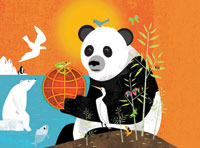Hot Spot
 One former Scout has spent much of his life working in the outdoors and helping to protect our planet: Jerome Ringo, environmental activist and BSA Silver Beaver Award recipient. For 20 years, Ringo worked in the petro-chemical industry and helped people learn how to better protect themselves against pollution. Having grown up hunting and fishing — he was the first African-American to work at Philmont — Ringo developed a connection with nature. From 2005 to 2007, he served as chairman of the National Wildlife Federation.
One former Scout has spent much of his life working in the outdoors and helping to protect our planet: Jerome Ringo, environmental activist and BSA Silver Beaver Award recipient. For 20 years, Ringo worked in the petro-chemical industry and helped people learn how to better protect themselves against pollution. Having grown up hunting and fishing — he was the first African-American to work at Philmont — Ringo developed a connection with nature. From 2005 to 2007, he served as chairman of the National Wildlife Federation.
Through his work with these organizations, Ringo understands the impact of changing weather patterns on wildlife. Here’s what Ringo and many scientists are saying about what’s happening around the world.
AFRICA
The continent of Africa has felt the effects more than any place, Ringo says. Up to a million wildebeests in the Serengeti plain travel north every dry season in search of water and food. Due to severe droughts the past several years, wildebeests, as well as zebras and antelopes, are finding less water along the way. Many never complete their journey.
ASIA
Much of the water in China, India and Nepal comes from glaciers in the Himalayas. “In 50 years, those glaciers could be gone,” Ringo says, causing a water shortage that would affect wildlife such as the already endangered panda.
Orangutans in Borneo are endangered due to destruction of tropical forest habitat. Many experts believe orangutans could become extinct in the wild in 10 to 15 years.
THE POLES
Arctic ice the size of New York, Georgia and Texas combined has melted. This habitat loss means fewer seals, which means less food for polar bears. Polar bears might swim up to 60 miles to find their next meal; many drown or starve.
Antarctic ice is also melting, changing where penguins breed and raise young. Warming ocean water reduces krill, penguins’ favorite food. The World Wildlife Fund reports the emperor penguin population has dropped 50 percent in the past 50 years.
AUSTRALIA
Some of Australia’s butterflies are under threat of extinction. Insects are the first to go, says Australian scientist Dr. Don Sands. “They’re the best indication of climate change because the impact on them is almost immediate,” Dr. Sands says. Because of their short life spans, if they don’t find food and mate quickly, species die out.
YOUR BACKYARD
“Climate changes affect bird migration patterns,” Ringo says. Winter arrives later and spring earlier. Birds that normally fly south for the winter might stick around or not fly as far south. Migrating species, including birds, butterflies and insects, are moving poleward. Robins have been spotted 500 miles north of the Arctic Circle. There is no word in the Inuit language for “robin.” These Native Americans living in this region never needed one before.
THE UNITED STATES
The National Wildlife Federation says that in the Florida Everglades, as sea levels rise, salt water creeps into freshwater areas and destroys wetlands. Fish and birds are threatened, as well as the endangered Key deer and Florida panther.
Spruce bark beetles, once limited to the Southeast, are migrating north due to warmer temps. “They’re eating forests in Canada and Alaska by the thousands of acres,” Ringo says. Mosquito habitats are also expanding to higher latitudes and elevations. Not only is this bad news for campers, but it also could mean an increase in the disease malaria.
THE RAIN FORESTS
The largest commercial cattle herd in the world lives along the Amazon River, passing huge amounts of the greenhouse gas methane. Deforestation for logging and soybeans adds to the problem. Biologist Daniel Nepstad of Woods Hole Research Center predicts that if this continues, 40 percent of the Amazon forest will be gone by 2050, potentially impacting all area wildlife, especially fish such as the piranha.
WHY SHOULD YOU GO GREEN? IT’S JUST PLAIN SMART.
It’s not politics. It’s the heart of Scouting: promoting conservation and responsible outdoorsmanship. Do your own part to reduce your impact on the Earth:
- Recycle.
- Use compact fluorescent light bulbs.
- Turn off lights and unplug electronics when you’re done.
- Plant trees.
- Turn thermostats down in winter, up in summer.
- Drive less: Ride your bike, take a bus, walk or carpool.
- Take shorter showers to use less hot water.
- Encourage adults to buy energy-efficient appliances and cars.
- Properly inflate car tires.
thank you Jerome Ringo for protecting our planet
my animal is sea turtle it is endangered because they get eating by birds.
Myanimal mite die because they said that 40% of the Amoson rain forest will be gone by 2050.That means that my animal will die and that is the Leporad .
I like your comments because I like helping the earth so that’s what my comment is about.
bye